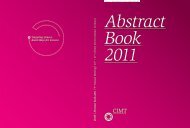Abstract Book 2010 - CIMT Annual Meeting
Abstract Book 2010 - CIMT Annual Meeting
Abstract Book 2010 - CIMT Annual Meeting
Create successful ePaper yourself
Turn your PDF publications into a flip-book with our unique Google optimized e-Paper software.
087 Lutz-Nicoladoni | Tumor biology & interaction with the immune system<br />
Reinforcement of Cancer Immunotherapy by Adoptive<br />
Transfer of cblb-deficient Cytotoxic T Lymphocytes<br />
combined with a Dentritic Cell Vaccine<br />
Christina Lutz-Nicoladoni 1,2 , Patrizia Stoitzner 3 , Magdalena Pircher 1,2 , Stephanie Wallner<br />
1,2 , Thomas Gruber 4 , Anna Maria Wolf 1,2 , Günther Gastl 1,2 , Josef Penninger 5 , Gottfried<br />
Baier 4 , Dominik Wolf 1,2<br />
1 Tyrolean Cancer Research Institute, Tumorimmunology, Innsbruck, Austria<br />
2 Medical University Innsbruck, Internal Medicine V, Hematology and Oncology, Innsbruck, Austria<br />
3 Medical University Innsbruck, Department of Dermatology and Venerology, Austria<br />
4 Medical University Innsbruck, Department for Medical Genetics, Molecular and Clinical Pharmacology, Austria<br />
5 Institute of Molecular Biotechnology of the Austrian Academy of Sciences, Vienna, Austria<br />
136<br />
During the last decades rapid progress in immuno-<br />
logy facilitated the development of tumor therapy<br />
based on cell transfer. Autologous tumorinfiltrating<br />
lymphocytes (TILs) are transferred after ex<br />
vivo clonal expansion or ex vivo transduction with<br />
tumor antigen specific T cell receptors (TCR) and<br />
subsequent expansion into patients. Adoptive T<br />
cell transfers (ATC) are often combined with lymphodepleting<br />
therapies. However, the success of<br />
cancer immunotherapy is limited by potent endogenous<br />
immune-evasion mechanisms, which are<br />
centrally mediated by transforming growth factor<br />
beta TGF-β. The RING E3 ubiquitin ligase casitas B<br />
cell lymphoma (Cbl-b) is a negative key regulator<br />
of T cell activation. Cblb-deficient T lymphocytes<br />
are uncoupled from the requirement of CD28 costimulation,<br />
are anergy-resistent and resistant to inhibition<br />
by TGF-β. As a consequence, cblb-deficient<br />
animals reject tumors via cytotoxic CD8+ T cells<br />
(CTLs), which makes Cbl-b an ideal target in adoptive<br />
T cell transfer therapy.<br />
Here we provide evidence that cblb-/- CTLs are<br />
hyper-responsive to TCR/CD28-stimulation in vitro<br />
and protected from the negative effects induced by<br />
TGF-β. Nevertheless and unexpectedly, adoptive<br />
transfer of polyclonal, non TCR-transgenic cblb-deficient<br />
CTLs into tumor bearing immunocompetent<br />
wildtype (wt) mice is not sufficient to reject B16ova<br />
or EG7 tumors in vivo. Thus, cblb-deficient transferred<br />
CD8+ T cells were in vivo re-activated by a<br />
dendritic cell (DC) vaccine (i.e. SIINFEKL-pulsed<br />
DC). In strict contrast to ATC monotherapy, this approach<br />
now delayed tumor outgrowth and significantly<br />
increased survival rates, which is paralleled<br />
by an increased CTL infiltration rate to the tumor<br />
site as well as enrichment of tumor antigen-specific<br />
and interferon-gamma (IFN-g)-secreting CTLs in<br />
the draining lymphnodes. Moreover, in vivo cytolytic<br />
activity was increased in tumor bearing mice<br />
treated with DCs and cblb-deficient CTLs compared<br />
to those treated with DCs plus wt CTLs.<br />
In summary, we provide experimental evidence that<br />
genetic inactivation of Cbl-b in polyclonal, non-TCR<br />
transgenic adoptively transferred CTLs serves as a<br />
novel “adjuvant approach”, suitable to augment the<br />
effectiveness of established anti-cancer immunotherapy<br />
in immuno-competent recipients.



